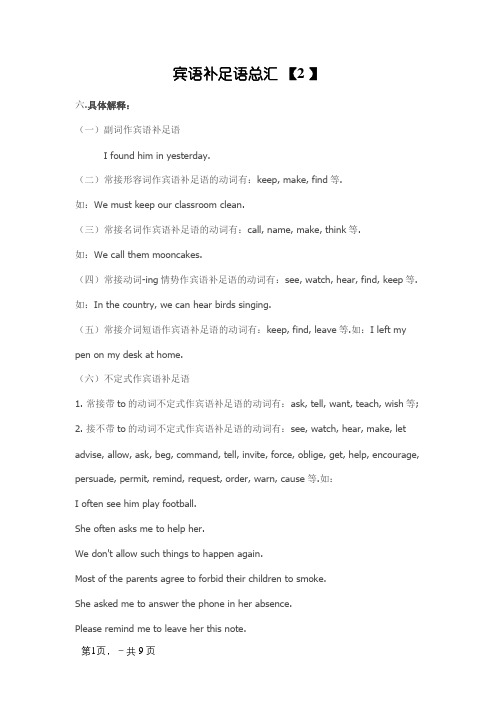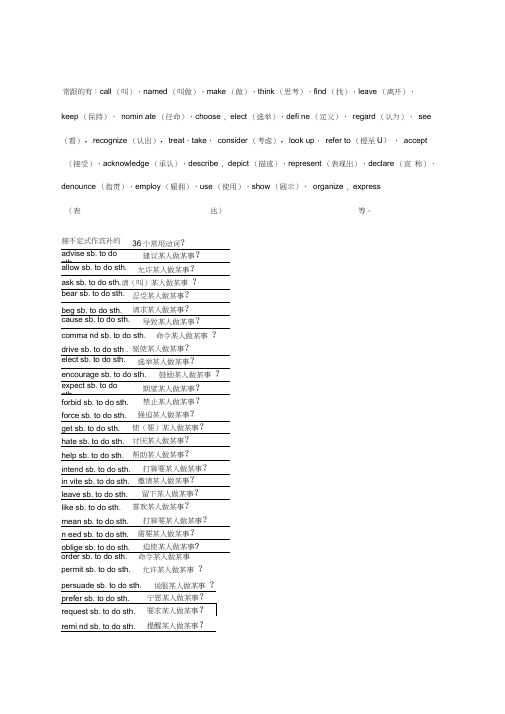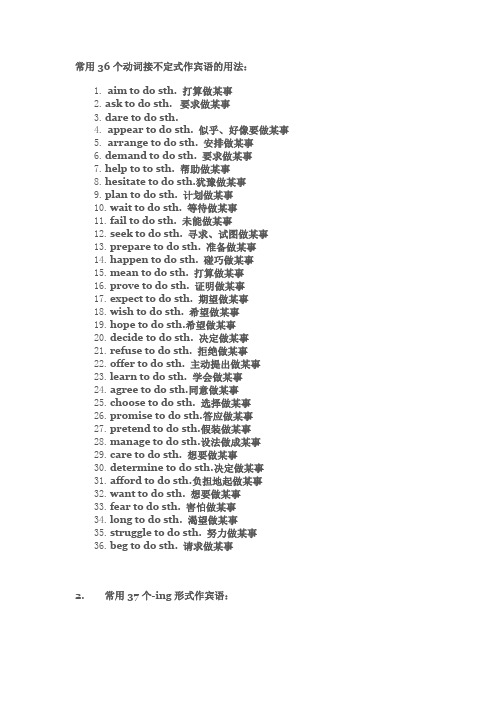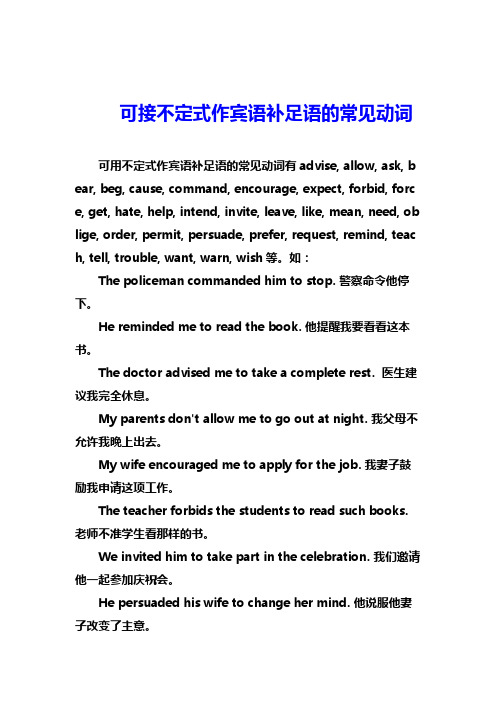接宾语补足语的动词汇总
不定式做宾语、补足语。

不定式做宾语、补足语。
不定式在“主语+谓语+宾语+宾语补足语”句型中充当宾语补足语。
在这一句型中,宾语是动词不定式的逻辑主语。
1.再表示感觉的动词后面作宾语补足语,并且不定式都不带to.这一类动词有:see, hear, feel, watch, notice, observe, look at, listen to,等。
I here them sing yesterday.昨天我听见他们唱歌了。
Did you see him go out?你看见他们出去了吗。
I felt something crawl up my leg.我感到有什么东西爬道我腿上了。
2.在使役动词后作宾语补足语,不定式不带to.这一类动词有:make, let, have等。
转为被动语态时,其后通常都用带to的不定式(have没有被动语态)What would you have me do?你要我做什么?She made him give up smoking.她让他戒烟了。
Let him do whatever he whishes to do.他想干什么就让他干吧。
3.在表示心理状态的动词后作宾语补足语。
这类动词有:consider, think, believe, discover, find, imagine, judge,suppose, prove 等。
这类动词后的不定式通常是“to be+形容词或名词”结构,think,consider,find后的to be常可省略。
We consider him (to be) a good teacher.我们认为他是一个好老师。
He proved that theory (to be) very important.他证明那个理论是很重要的。
I thought her (to be) nice and honest the first time I met her.我第一次见到她的时候就认为她人很好,很诚实。
宾语补足语总汇

宾语补足语总汇【2 】六.具体解释:(一)副词作宾语补足语I found him in yesterday.(二)常接形容词作宾语补足语的动词有:keep, make, find等.如:We must keep our classroom clean.(三)常接名词作宾语补足语的动词有:call, name, make, think等.如:We call them mooncakes.(四)常接动词-ing情势作宾语补足语的动词有:see, watch, hear, find, keep等. 如:In the country, we can hear birds singing.(五)常接介词短语作宾语补足语的动词有:keep, find, leave等.如:I left my pen on my desk at home.(六)不定式作宾语补足语1. 常接带to的动词不定式作宾语补足语的动词有:ask, tell, want, teach, wish等;2. 接不带to的动词不定式作宾语补足语的动词有:see, watch, hear, make, let advise, allow, ask, beg, command, tell, invite, force, oblige, get, help, encourage, persuade, permit, remind, request, order, warn, cause等.如:I often see him play football.She often asks me to help her.We don't allow such things to happen again.Most of the parents agree to forbid their children to smoke.She asked me to answer the phone in her absence.Please remind me to leave her this note.She requested him to go with her.3. 用不定式作宾语补足语的几种解释:①help后面作宾语补足语的动词不定式可以带to也可以不带to.如:I often help my mother(to) do some housework.②在使役动词后作宾语补足语,不定式不带to.有些动词跟不定式作宾语补足语时省去了to,这些动词有:一感二听三让四不雅看.一感:feel二听:hear, listen to三让:let, have, make四不雅看:observe, see, watch, look at这类动词有:make, let, have等.转为被动语态时,厥后平日都用带to的不定式(have没有被动语态).What would you have me do?你要我做什么?She made him give up smoking.她让他戒了烟.Let him do whatever he wishes to do.他想干什么就让他干吧.Though he had often made his little sister cry, today he was made to cry by his littlesister.固然经常是他弄哭小妹妹,但今天他却被小妹妹弄哭了3. 控制“使役动词 have + 宾语+曩昔分词”的几种寄义在“ have +宾语+曩昔分词”构造中,曩昔分词作宾语补足语, have 也可用 get .这一构造具有以下几种寄义:①意为“主语请别人做某事”.例如:He wants to have his eyes examined tomorrow.他明天想去检讨眼睛.(“检讨”的动作由大夫来进行)②意为“主语遭受.遭受某一不高兴.不测的工作”.例如:Be careful, or you'll have your hands hurt.当心,不然会弄伤手的.③意为“使完成某事”,工作既可所以别人做完,也可以由主语参与完成.例如:He had the walls painted this morning.他今早把墙漆了. (主语本身可能参与)④动词不定式也可作一些短语动词的宾语补足语.I'm waiting for James to arrive.我正等着詹姆斯的到来.He's arranged for a car to pick them up at the station.他已安排了一辆汽车去车站接他们.The UN has called on both sides to observe the cease fire.结合国号令交战两边遵照停火协议.(七)分词作宾语补足语用如今分词作宾补,解释宾语是动作的发出者,形成逻辑上的主谓关系;用曩昔分词作宾补,表示宾语是动作的推却者,组成逻辑上的动宾关系.1. 跟分词作宾补的动词有:catch, have get, keep, hear, find, feel, leave, make, want, start, notice, observe, watch, set等.例如:There was so much noi se that the speaker couldn’t make himself heard.因为十分吵闹,讲话人没法让人听到他的声音.When he awoke, he found himself being looked after by an old woman.他醒来的时刻发明一位老迈娘正在照料他.2. 几种用曩昔分词作宾语补足语的情形解释:①表示“意欲;敕令”的动词,如 like, want, wish, order 等,可用曩昔分词作宾语补足语.例如:The father wants his daughter taught the piano.这位父亲想让女儿学钢琴.②感官动词 see, hear, notice, observe, watch, feel, find 等后,可用曩昔分词作宾语补足语.例如:I saw an old man knocked down by a car just now.适才我看到一位白叟被车撞倒了.③使役动词 have, get, make, leave, keep等后可用曩昔分词作宾语补足语.例如:Have you got your films developed? 你拿菲林去冲洗了没有?④“ with +宾语+曩昔分词”构造中,曩昔分词用作介词 with 的宾语补足语.这一构造平日在句中作时光.方法.前提.原因等状语.例如:The murderer was brought in, with his hands tied behind his back.凶手被带进来了,他的双手被绑在背后.(表方法)With water heated, we can see the steam.水一被加热,我们就会看到水蒸气.(表前提)With the matter settled, we all went home.工作得到解决,我们都回家了.(表原因)V.+宾语+宾补高考全解析“动词+宾语+宾补”的试题是高测验题中常考的常识点,这里呢,我就高考常考的能跟接“宾语+宾补”复合构造的动词进行侧重讲授,以关心大家控制这一常识点:一.“make+宾语+宾补”的用法“make+宾语+宾补”这一构造中,宾语补足语可以由名词.形容词.曩昔分词.不定式等来充当,例如:(1)A good friend is someone who makes you happy.(形容词作宾补)(2)They made me repeat the story.(省to的动词不定式)(3)He raised his voice to make himself heard.(曩昔分词作宾补) 注:“make+宾语+宾补”构造中不用如今分词充当宾补.(4)We made him monitor of our class.(名词作宾补)注:职务名词充当宾补时其前面不要加冠词. 【高测验题链接】1. He is very popular among his students as he always tries to make them _____ in his lectures.(07江苏卷)A.interested B.interesting C.interest D.to interest2. My parents have always made me _____ about myself, even when I was twelve. A.feeling well B.feeling good C.feel well D.feel good答案:1.A 2.D二.“with+宾语+宾补”的用法“with+宾语+宾补”是高测验题中考核十分频仍的构造,“with+宾语+宾补”构造中的宾补重要有形容词.如今分词.曩昔分词.动词不定式等,在考题中常请求选择宾补的情势,在选择时宾补空间该应用什么情势,重要限决于宾语与宾补的关系,自动关系用如今分词,被动关系则用曩昔分词,此外,不定式作宾补要表示寄义为未来的意味,例如:(1)With so many people communicating in English every day, it will become more and more important to have a good knowledge of English.(宾语so many people 与communicate是自动关系,是以用如今分词作宾补)(2)With everything he needed to buy, he went into the store.(不定式作宾补表示未来的寄义)(3)With everything he needed bought, he left the store.(曩昔分词作宾补表被动表完成)(4)With my key lost, I couldn’t enter my room.(曩昔分词作宾补)(5)With nothing to do, I went out for a walk.(不定式作宾补)(6)I went out with the window open.(形容词作宾补) 别的,“with+宾语+宾补”构造中还可由介词短语.副词短语来充当宾补,如:(1) She said good-bye with tears in her eyes.(2) He left the room with the light still on. 【高测验题链接】1.—Come on, please give me some ideas about the project. —Sorry. With so much work ______ my mind, I almost break down.A.filled B.filling C.to fill D.being filled2. John received an invitation to dinner, and with his work ______ he gladly accepted it.A.finished B.finishing C.having finished D.was finished3. I couldn’t do my homework with all the noise______.(05北京)A.going on B.goes on C.went on D.to go on 答案:1. B 2.A 3. A三.“have+宾语+宾补”的用法在“have+宾语+宾补”这一构造用法中,充当宾补的常用的有do,doing, done和adj,例如:(1) I’ll have my hair cut this afternoon.我今世界午要剃头.(2) I won’t have you saying to your mother that way.(3) He realized that she did not wish to have her go with him.(4) I expect Amy will have the tea ready directly. 留意:have sth done的寄义为“请别人来做某事或遭碰到某到情形”,例如: (1)I had the door painted last week.(2)He had his pocket picked.(3)She had her watch stolen. 【高测验题链接】1. Jenny hopes that Mr. Smith will suggest a good way to have her written English _____ in a short period.A.improved B.improving C.to improve D.improve2.—Did Peter fix the computer himself? —He _____, because he doesn’t know much about computers.(07安徽卷)A.has it fixed B.had fixed it C.had it fixed D.fixed it 3.You should understand the traffic rule by now. You’ve had it _____ often enough.(05天津) A.explaining B.to explain C.explain D.explained答案:1. A 2. C 3. D四.“find+宾语+宾补”的用法“find+宾语+宾补”这一构造中的宾语补足语可以由如今分词.曩昔分词.名词.形容词.副词.介词短语以及不定式to be等来充当.分离举例如下:(1)You will find it a very difficult book.(2)The youth found it a hard problem to think about.(3)When he came to himself, he found himself surrounded by a group of boys. (4)I hope to find you in better spirits when we meet again.(5)I find the Chinese people to be happy and cheerful.留意:find+宾语+宾补这一构造中平日不应用动词本相来充当宾语补足语,即没有“find+宾语+动词本相”如许的构造. 【高测验题链接】A cook will be immediately fired if he is found ____ in the kitchen.(03全国卷) A.smoke B.smoking C.to smoke D.smoked 答案:B. 五.“leave+宾语+宾补”的用法Leave+宾语+宾语补足语,个中宾语补足这一成分可以由曩昔分词.如今分词.形容词.介词的复合构造等来充当,分述如下:1.由曩昔分词来充当宾语补足语:leave sth/sb done,常用来表示宾语所处的状况或表示动作已经完成.(1)Please excuse me if I have left any of your questions unanswered.(2)He got up slowly leaving the lunch unfinished.(3)Did you leave the doors and windows firmly fastened? △可用于被动语态:Hi!My patient can’t be left unattached.2.由如今分词来充当宾语补足语:leave sb/sth doing,常用来表示使或人或某物一向做某事: (1)Don’t leave her waiting outside in the rain.(2)They went off together and left me sitting there. (3)We left him paintingthe gate. △可用于被动语态: Now the temple has only its walls left standing. The papers were left lying around.3.由形容词来充当宾语补足语: (1)You’d better leave the drawing-room door open. (2)His illness has left him weak. △可用于被动语态: The window wasleft open.4.由介词的复合构造充当宾语补足语: (1)Leave him in peace! (2)His illness left him with a weak heart. (3)You’ve left her name off the list. △可用于被动语态:I was left without a ray of hope. 【高测验题链接】A good story does not necessarily have to have a happy ending, but the reader must not be left______.(06天津卷) A.unsatisfied B.unsatisfying C.to be unsatisfying D.being unsatisfied 答案:A六.“hear+宾语+宾补”的用法“hear+宾语+宾补”这一构造中的宾补常可以由如今分词.不带to的不定式.曩昔分词等来充当,如: Through the wall he could hear Harris cleaning his teeth. She could hear the rain pattering against the windows. Have you ever heard a pop song sung in Japanese? I won’t hear anything said against him behindhis back. 【高测验题链接】 After a knock at the door, the child heard his mother’s voice _____ him.(07上海卷) A.calling B.called C.being called D.to call 答案:A.。
复合宾语

复合宾语结构的用法在英语中,有些动词接了一个宾语后句子意思仍不完整,还需要再加上一个词或短语放在宾语之后来补充说明其身份、特征、状态或所做的动作,这种“宾语+宾语补足语”结构称为复合宾语,其特点是“宾语与宾补在逻辑上有着主谓或主表关系”。
现将复合宾语的类型作一归纳和说明,供大家学习参考。
一、宾语+名词:常用于该结构的动词有:call , name , make , find , choose , think , leave等。
例如:1. We call him Jack .我们叫他杰克。
2. They made Li Lei their monitor .他们选李磊当班长。
二、宾语+形容词:常见的动词有:think , believe , leave , drive , make , keep , turn , wish ,want等。
例如:1. Do you think his idea wrong ?你认为他的意见错了吗?2. We must keep our classroom clean .我们必须保持教室清洁。
三、宾语+副词:副词作宾补常表示宾语的状态,与宾语有逻辑上的主表关系。
常见的副词有:down , up , here , there , home , in , out , anywhere等。
例如:1. Let him in (out) .让他进来(出去)。
2. Mr . Li drove us home .李先生开车送我们回家。
3. Have you seen him anywhere ?你有没有在什么地方见过他?四、宾语+介词短语:介词短语作宾补常表示其逻辑主语(即宾语)所处的状态,两者有主表关系。
例如:1. We found everything in good order .我们发现一切井然有序。
2. I’ll leave a message on his desk .我将留个条子在他桌上。
接宾语补足语的动词汇总

常跟的有:call (叫),named (叫做),make (做),think (思考),find (找),leave (离开),keep (保持),nomin ate (任命),choose , elect (选举),defi ne (定义),regard (认为),see (看),recognize (认出),treat,take,consider (考虑),look up,refer to (提至U),accept (接受),acknowledge (承认),describe , depict (描述),represent (表现出),declare (宣称),denounce (指责),employ (雇佣),use (使用),show (展示),organize , express(表达)等。
permit sb. to do sth. 允许某人做某事?常跟的有:call (叫),named (叫做),make (做),think (思考),find (找),leave (离开),teach sb. to do sth . 教某人做某事wa nt sb. to do sth. 想要某人做某事warn sb. to do sth. 警告某人做某事汉语的"阻止某人做某事”,英语可说成接现在分词作宾补的20个常用动词bring sb. doi ng sth.引起某人做某事catch sb. doing sth. 碰上(撞上)某人做某事discover sb. doi ng sth. 发现某人做某事feel sb. doi ng sth. 感觉某人做某事find sb. doi ng sth. 碰上(撞上)某人做某事get sb. doing sth. 使某人做某事have sb. doi ng sth. 使某人做某事hear sb. doi ng sth. 听见某人做某事keep sb. doi ng sth. 使某人不停地做某事listen to sb. doi ng sth. 听某人做某事The chairma n called on Mr Brown to speak .主席请布朗先生讲话。
可用不定式宾语补足语的动词

用不定式的动词:一.接不定式: agree, decide, dare, expect, fail, hope, learn, lmanage, plan, pretend, promise, refuse, wish...只跟不定式作宾语的动词速记口诀 :三个希望两答应,两个要求莫拒绝;设法学会做决定,不要假装在选择。
三个希望两答应:hope,wish,want,agree,promise两个要求莫拒绝:demand,ask,refuse设法学会做决定:manage,learn,decide不要假装在选择:petend,choose二,不定式作宾语补足语的动词有:advise,allow,ask,beg,cause,encourage,expect, force,invite,order, teach,tell,want,warn等。
三,可用不定式宾语补足语,to省略的动词:在英语中,动词不定式可以作动词的宾语补足语。
其中,有11.5个动词在要求不定式作宾补时,要将动词不定式的小品词“to”省略掉,这11.5个动词是:see(看见),watch(观看),look at(看,瞧),notice(看,注意),observe(看到,注意到)(以上五个单词都算作“看”字之列);hear(听),listen(听)(以上两个单词属“听”字之列);let(使,让);make(使),have(使,让)(以上三个算作使役动词); feel(感觉),以上共10个动词。
最后还有动词help(帮助)作谓语时,其后不定式作宾补可带to,也可以不带to,故它算0.5个动词。
这11.5个动词去一个个记住较困难,若采用以下三个口诀中的一种记它们就比较简单了。
请看:(A)不定式,作宾补, 11个半动词后省to:hear,see,watch,observe, lookat,feel,notice和listen to;make,have,let和help,通用句型如hear you do。
宾语补足语总汇

宾语补足语总汇Company Document number:WTUT-WT88Y-W8BBGB-BWYTT-19998宾语补足语总汇六、具体说明:(一)副词作宾语补足语I found him in yesterday.(二)常接形容词作宾语补足语的动词有:keep, make, find等。
如:We must keep our classroom clean.(三)常接名词作宾语补足语的动词有:call, name, make, think等。
如:We call them mooncakes.(四)常接动词-ing形式作宾语补足语的动词有:see, watch, hear, find, keep 等。
如:In the country, we can hear birds singing.(五)常接介词短语作宾语补足语的动词有:keep, find, leave等。
如:I left my pen on my desk at home.(六)不定式作宾语补足语1. 常接带to的动词不定式作宾语补足语的动词有:ask, tell, want, teach, wish 等;2. 接不带to的动词不定式作宾语补足语的动词有:see, watch, hear, make, let advise, allow, ask, beg, command, tell, invite, force, oblige, get, help, encourage, persuade, permit, remind, request, order, warn, cause等。
如:I often see him play football.She often asks me to help her.We don't allow such things to happen again.Most of the parents agree to forbid their children to smoke.She asked me to answer the phone in her absence.Please remind me to leave her this note.She requested him to go with her.3. 用不定式作宾语补足语的几种说明:①help后面作宾语补足语的动词不定式可以带to也可以不带to。
常用36个动词接不定式作宾语的用法

常用36个动词接不定式作宾语的用法:1.aim to do sth.打算做某事2.a sk to do sth. 要求做某事3.d are to do sth.4.appear to do sth.似乎、好像要做某事5.arrange to do sth.安排做某事6.d emand to do sth.要求做某事7.h elp to to sth.帮助做某事8.h esitate to do sth.犹豫做某事9.p lan to do sth.计划做某事10.w ait to do sth.等待做某事11.f ail to do sth.未能做某事12.s eek to do sth.寻求、试图做某事13.p repare to do sth.准备做某事14.h appen to do sth.碰巧做某事15.m ean to do sth.打算做某事16.p rove to do sth.证明做某事17.e xpect to do sth.期望做某事18.w ish to do sth.希望做某事19.h ope to do sth.希望做某事20.d ecide to do sth.决定做某事21.r efuse to do sth.拒绝做某事22.o ffer to do sth.主动提出做某事23.l earn to do sth.学会做某事24.a gree to do sth.同意做某事25.c hoose to do sth.选择做某事26.p romise to do sth.答应做某事27.p retend to do sth.假装做某事28.m anage to do sth.设法做成某事29.c are to do sth.想要做某事30.d etermine to do sth.决定做某事31.a fford to do sth.负担地起做某事32.w ant to do sth.想要做某事33.f ear to do sth.害怕做某事34.l ong to do sth.渴望做某事35.s truggle to do sth.努力做某事36.b eg to do sth.请求做某事2. 常用37个-ing形式作宾语:1.a dmit doing sth.承认做某事2.r eport doing sth.报告做某事3.a ppreciate doing sth.感激做某事4.d eny doing sth.否认做某事5.e xplain doing sth.解释做某事6.m ention doing sth.提及做某事7.r esist doing sth.拒绝做某事8.s tand doing sth.忍受做某事9.s top doing sth.停止做某事10.i magine doing sth..想象做某事11.r ecall doing sth.想起做某事12.s uggest doing sth.建议做某事13.m ind doing sth.介意做某事14.f inish doing sth.完成做某事15.e njoy doing sth.喜欢做某事16.k eep doing sth.继续做某事17.p ractise doing sth.练习做某事18.m issing doing sth.错过做某事19.a void doing sth.避免做某事20.d elay doing sth.推迟做某事21.e xcuse doing sth.借口做某事22.e scape doing sth.逃脱做某事23.c onsider doing sth.考虑做某事24.a dvise doing sth.建议做某事25.a llow doing sth.允许做某事26.d iscuss doing sth.讨论做某事27.d islike doing sth.讨厌做某事28.f ancy doing sth.设想做某事29.f orbid doing sth.禁止做某事30.p ardon doing sth.原谅做某事31.p ermit doing sth.允许做某事32.p revent doing sth.阻止做某事33.p rohibit doing sth.禁止做某事34.r isk doing sth.冒险做某事35.u nderstand doing sth.理解做某事36.g ive up doing sth.放弃做某事37.p ut off doing sth.推迟做某事3. 接不定式与-ing形式意义相近的12个动词:like, love, hate,begin , start ,prefer to do sth. / prefer doing sth. continue, intendattempt, bother(麻烦),can’t bear to do sth. / doing sth.4. 接不定式作宾语补足语的36个常用动词1.a dvise sb. to do sth.建议某人做某事2.l eave sb.to do sth.留下某人做某事3.a llow sb.to do sth.允许某人做某事4.l ike sb. to do sth.喜欢某人做某事5.a sk sb. to do sth.要求某人做某事6.m ean sb. to do sth.打算某人做某事7.b ear sb. to do sth.忍受某人做某事8.n eed sb.to do sth.需要做某事9.b eg sb. to do sth. 请求某人做某事10.o blige (迫使)11.c ause(导致)12.o rder ,13.c ommand(命令),14.p ermit,15.d rive(驱使),16.p ersuade,17.e lect (选举) ,18.p refer,19.e ncourage,20.r equest (要求) ,21.e xpect,22.r emind(提醒),23.f orbid,24.t each,25.f orce,26.t ell,27.g et(使)28.t rain(训练)29.h ate,30.t rouble (麻烦)31.h elp ,32.w ant ,33.i ntend ,34.w arn(警告)35.i nvite36.w ish.5. 接现在分词作宾语补足语的20个常用短语:1.b ring sb. doing sth.引起某人做某事2.l ook at sb. doing sth.看着某人做某事3.c atch sb. doing sth.碰上某人做某事4.n otice sb. doing sth.注意到某人做某事5.d iscover sb. doing sth.发现某人做某事6.o bserve sb.doing sth.观察某人做某事7.f eel sb. doing sth.感觉某人做某事8.p revent sb. doing sth.阻止某人做某事9.f ind sb. doing sth.发现(碰上)某人做某事10.s ee sb. doing sth.看见某人做某事11.g et sb. doing sth.使某人做某事12.s end sb. doing sth,使某人(突然)做某事13.h ave sb. doing sth.使某人做某事14.s et sb. doing sth.使(引起)某人做某事15.h ear sb. doing sth.听见某人做某事16.start sb. doing sth.使某人开始做某事17.k eep sb doing sth.使某人不停地做某事18.s top sb doing sth.阻止某人做某事19.l isten to sb. doing sth.听某人做某事20.w atch sb. doing sth.观看某人做某事6. 接动词原形作宾语补足语的11个动词:1.f eel sb. do sth. 感觉某人做某事2.l et ,3.h ave ,4.l isten to ,5.h ear ,6.l ook at ,7.m ake ,8.n otice ,9.o bserve,10.w atch ,11.s ee7. 接双宾语的38个常用动词1)双宾语易位时需要借助介词to的常用动词:1.a ward sb.sth. / sth. to sb. 颁奖给某人2.r eturn(归还),3.b ring,4.s end,5.h and ,6.s ell ,7.l end,8.s erve(招待),9.m ail (邮),10.s how ,11.o ffer,12.t ake,13.o we(欠)14.t each,15.p ass ,16.t ell ,17.p ay,18.t hrow ,19.p ost,20.w rite ,21.r ead .2)双宾语易位时需要借助介词for的常用动词17个:1.b ook sb. sth. / sth. for sb.为某人预订某物2.m ake sb. sth./ sth. for sb.为某人做某事3.b uy ,4.o rder ,5.c hoose ,6.p ick,7.c ook ,8.p repare ,9.d raw,10.s ave,11.f etch(取),12.s ing,13.f ind,14.s pare(为某人让出某物),15.f ix sb.sth./sth. for sb. (为某人准备某物),16.s teal ,17.g et (为某人拿来某物)。
可接不定式作宾语补足语的常见动词

可接不定式作宾语补足语的常见动词可用不定式作宾语补足语的常见动词有advise, allow, ask, b ear, beg, cause, command, encourage, expect, forbid, forc e, get, hate, help, intend, invite, leave, like, mean, need, ob lige, order, permit, persuade, prefer, request, remind, teac h, tell, trouble, want, warn, wish等。
如:The policeman commanded him to stop. 警察命令他停下。
He reminded me to read the book. 他提醒我要看看这本书。
The doctor advised me to take a complete rest. 医生建议我完全休息。
My parents don't allow me to go out at night. 我父母不允许我晚上出去。
My wife encouraged me to apply for the job. 我妻子鼓励我申请这项工作。
The teacher forbids the students to read such books. 老师不准学生看那样的书。
We invited him to take part in the celebration. 我们邀请他一起参加庆祝会。
He persuaded his wife to change her mind. 他说服他妻子改变了主意。
Their parents prefer them to be home early. 他们的父母希望他们早点回家。
注:不要受汉语意思影响而误用不定式作宾语补足语。
如:汉语可说“害怕某人做某事”,但英语不说 fear sb to do st h。
- 1、下载文档前请自行甄别文档内容的完整性,平台不提供额外的编辑、内容补充、找答案等附加服务。
- 2、"仅部分预览"的文档,不可在线预览部分如存在完整性等问题,可反馈申请退款(可完整预览的文档不适用该条件!)。
- 3、如文档侵犯您的权益,请联系客服反馈,我们会尽快为您处理(人工客服工作时间:9:00-18:30)。
接宾语补足语的动词汇总
接不定式作宾补的36个常用动词
advise sb. to do sth. 建议某人做某事
allow sb. to do sth. 允许某人做某事
ask sb. to do sth.请(叫)某人做某事
bear sb. to do sth.忍受某人做某事
beg sb. to do sth. 请求某人做某事
cause sb. to do sth. 导致某人做某事
命令某人做某事
drive sb. to do sth .驱使某人做某事
elect sb. to do sth. 选举某人做某事
encourage sb. to do sth. 鼓励某人做某事
expect sb. to do sth. 期望某人做某事
forbid sb. to do sth. 禁止某人做某事
force sb. to do sth. 强迫某人做某事
get sb. to do sth. 使(要)某人做某事
hate sb. to do sth. 讨厌某人做某事
help sb. to do sth. 帮助某人做某事
intend sb. to do sth. 打算要某人做某事
invite sb. to do sth. 邀请某人做某事
leave sb. to do sth. 留下某人做某事
like sb. to do sth. 喜欢某人做某事
mean sb. to do sth. 打算要某人做某事
need sb. to do sth. 需要某人做某事
oblige sb. to do sth. 迫使某人做某事
order sb. to do sth. 命令某人做某事
permit sb. to do sth. 允许某人做某事
persuade sb. to do sth. 说服某人做某事
prefer sb. to do sth. 宁愿某人做某事
request sb. to do sth. 要求某人做某事
remind sb. to do sth. 提醒某人做某事
teach sb. to do sth .教某人做某事
tell sb. to do sth. 告诉某人做某事
train sb. to do sth. 训练某人做某事
trouble sb. to do sth. 麻烦某人做某事
want sb. to do sth. 想要某人做某事
warn sb. to do sth. 警告某人做某事
wish sb. to do sth. 希望某人做某事
汉语的“原谅某人做某事”,英语可说成excuse [forgive] sb. for doing sth.。
汉语的“希望某人做某事”,英语可说成wish sb. to do sth.。
汉语的“建议某人做某事”,英语可说成advise sb. to do sth.。
汉语的“安排某人做某事”,英语可说成arrange for sb. to do sth.。
汉语的“要求某人做某事”,英语可说成demand of sb. to do sth.。
汉语的“感谢某人做某事”,英语可说成thank sb. for doing sth.。
汉语的“祝贺某人做某事”,英语可说成congratulate sb. on doing sth.。
汉语的“阻止某人做某事”,英语可说成prevent sb. from doing sth.。
接现在分词作宾补的20个常用动词
bring sb. doing sth.引起某人做某事 catch sb. doing sth. 碰上(撞上)某人做某事
discover sb. doing sth. 发现某人做某事 feel sb. doing sth. 感觉某人做某事
find sb. doing sth. 碰上(撞上)某人做某事 get sb. doing sth. 使某人做某事
have sb. doing sth. 使某人做某事 hear sb. doing sth. 听见某人做某事
keep sb. doing sth. 使某人不停地做某事 listen to sb. doing sth. 听某人做某事
look at sb. doing sth. 看着某人做某事 notice sb. doing
sth. 注意到某人做某事
observe sb. doing sth. 观察某人做某事 prevent sb. doing sth. 阻止某人做某事
see sb. doing sth. 看见某人做某事 send sb. doing sth.使某人(突然)做某事
set sb. doing sth. 使(引起)某人做某事 start sb. doing sth. 使某人开始做某事
stop sb. doing sth. 阻止某人做某事 watch sb. doing sth. 观察某人做某事
接动词原形作宾补的11个常用动词
feel sb. do sth. 感觉某人做某事 have sb. do sth. 使某人做某事
hear sb. do sth. 听见某人做某事 let sb. do sth.让某人做某事
listen to sb. do sth. 听着某人做某事 look at sb. do sth. 看着某人做某事
make sb. do sth. 使某人做某事 notice sb. do sth. 注意某人做某事
observe sb. do sth. 观察某人做某事 see sb. do sth. 看见某人做某事
watch sb. do sth. 观察某人做某事
在某些短语后也可跟带to的不定式作宾补。
这类动词短语常见的有:wait for,call on,depend on,care for,long for等。
例如:n.鳄鱼等着猴子再下来。
The chairman called on Mr Brown to speak.主席请布朗先生讲话。
I shouldn't care for that man to be my doctor.我不要那人给我看病。
不带to的不定式作宾补
动词不定式在使役动词(make,let, have)或感官动词(feel,listen to,hear, look at,see,watch,notice)之后作宾补时不定式需省去to。
为了便于记忆,我们可以这样记“一感”(feel)、“二听”(listen to, hear)、“三让”(let,make,have)、“四看”(look at,see,watch,notice)。
